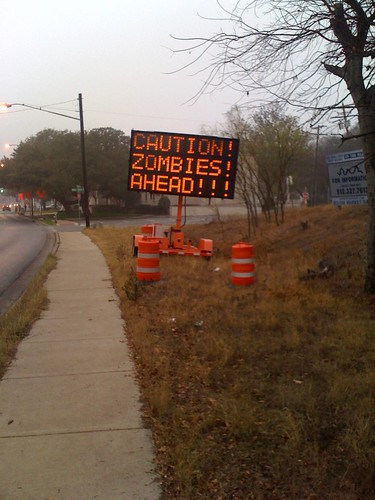
As noted, my post of the zombie construction sign hack has gone persistently viral, with daily Google alerts regarding new publications around the planet of one or more of our photos of the Austin mod alerting drivers to the Nazi zombie attack and the imperative to run for cold climates. (My son was even asked about one of my photo credits by some of his schoolmates.)
Which is somewhat ironic, since I am not that big a fan of the zombie sub-genre. For example, when I stop at my local comic book store and find racks of Marvel Zombies, my interest is repelled. Not just because the idea of Captain America as a zombie is the height of shark-jumping.

My view is that the zombiefication of the world is kind of stating the obvious. That is because I believe that the increasingly ubiquitous idea of everyday zombies is a psychologically accurate expression of our state of contemporary alienation — a variation on the same truths revealed through our better post-apocalyptic narratives. I touched on this topic in an essay I recently wrote that wrestles with, among other things, the role of dystopian zombies in science fiction as avatars of our estrangement from our fellow man in advanced capitalist society:
"The fuller social implications [of post-apocalyptic cozy catastrophe narratives] are revealed more explicitly, if with less authorial self-awareness, in Richard Matheson’s I Am Legend, a story with such pop memetic potency that it has been filmed three times in four decades. The novel opens with the physician protagonist settling down at dusk in the comfort of his barricaded townhome in plague-ridden Los Angeles:
'He sat in the living room, trying to read. He’d made himself a whisky and soda at his small bar and he held the cold glass as he read a physiology text. From the speaker over the hallway door, the music of Schönberg was playing loudly.
'Not loudly enough, though. He still heard them outside, their murmuring and their walkings about and their cries, their snarling and fighting among themselves. Once in a while a rock or brick thudded off the house. Sometimes a dog barked.

'And they were all there for the same thing.
'Robert Neville closed his eyes a moment and held his lips in a tight line. Then he opened his eyes and lit another cigarette, letting the smoke go deep into his lungs.
'He wished he’d had time to soundproof the house, It wouldn’t be so bad if it weren’t that he’d had to listen to them. Even after five months, it got on his nerves.'
"As Neville stares into his microscope searching for a cure to the mysterious virus that has rendered him alone, he reveals the extent to which his cozy driving tour of an apparently deserted Los Angeles is a depiction of real-world estrangement. Neville is *not* the last man Earth. He’s just the last upper-middle class professional white guy. A man who experiences his world largely through the medium of his own alienation, spends his days in the solitary performance of his professional chores, finds himself unable to form authentic emotional connections with the world around him, his comfortable suburban home a prison that protects him from the world of the real outside. As Neville drives around scavenging for commodities, he is surrounded by other humans, but they are dead to him other than as tribal predators or lewd objects of sexual desire. Like the protagonists of George Romero’s Dawn of the Dead, locked in a giant shopping mall that has been overtaken by zombies! (Perhaps you know the feeling?)"

I think this postulate probably has the best chance of explaining how it was that Cormac McCarthy's publication of the world's first literary realist zombie novel became an Oprah selection and a Viggo Mortenson major motion picture. File under nonfiction?
For the fuller discussion of these topics (including the aforementioned essay, "Feeling very estranged: science fiction and society in the aftermath of the twentieth century"), you can spend your spring break with yours truly and many bigger brains (including Mark Dery, Bruce Sterling, Christopher Priest, M. John Harrison, and Linda Nagata) March 16-20 at the Festival de Mexico in Mexico City, where we will put forth our essays and other thoughts on the important topic of Parallel Worlds: The Impact and Influence of Science Fiction on Contemporary Culture. The zombie-fighting Mezcal is on me.

3 comments:
I got interested in the Zombie Apocalypse recently via a back door: the Dance of Death. Late Medieval, Early Modern imagery about the immanence of Death & man's need to face prepare himself for it. Death is inescapable. It ultimately Triumphs over us all. What is so often missing from works by Holbein and Breughel is a sense of redemption. There is little. We sin and we die, damned and alone.
I suppose I'm alienated & morbid.
In America, the zombie is clearly a metaphor for the negro, and the zombie apocalypse a race war.
Soviet Onion--I completely agree. See, e.g., The Omega Man (the Charlton Heston film version of I Am Legend), in which most of the bio-zombies are played by African-Americans in white face...
Post a Comment